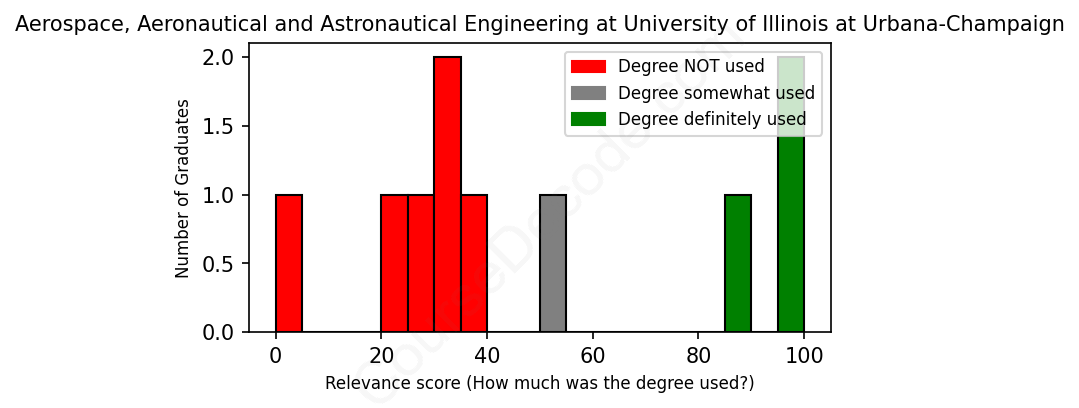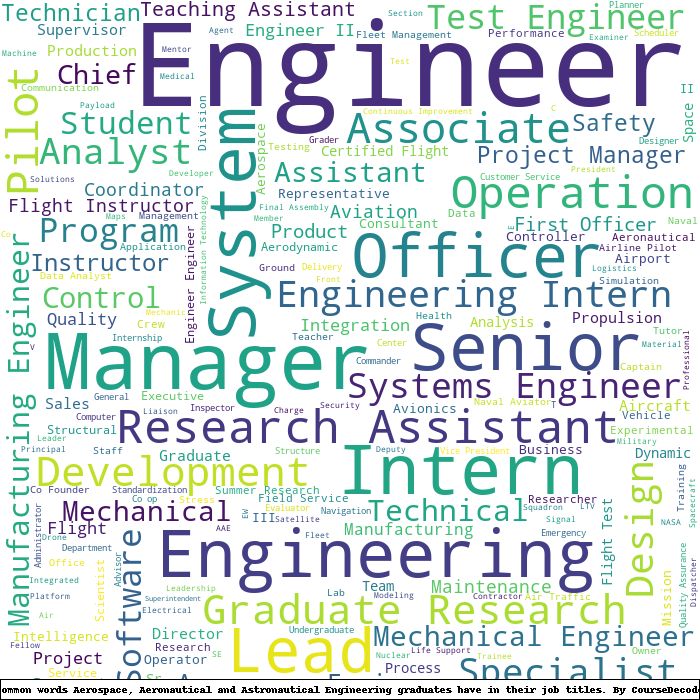
First, some facts. Of the Aerospace, Aeronautical and Astronautical Engineering graduates from University of Illinois at Urbana-Champaign we've analyzed , here's how many have used (or NOT used) their degree in their career:

These are estimates based on AI analysis of 10 LinkedIn profiles (see below).
The verdict? Significantly below average. Overall, with an average relevance score of 48%, Aerospace, Aeronautical and Astronautical Engineering graduates from University of Illinois at Urbana-Champaign have a much lower likelihood (-19%) of finding work in this field compared to the average graduate across all fields:
And for comparison, here's the chart for all profiles we've looked at across all degrees.
Also, after graduating, only 30% of these graduates have pursued further education other than another Bachelor's degree (such as a Masters degree or other), compared to the average across all profiles of 35%. This suggests a Bachelors degree is enough for most Aerospace, Aeronautical and Astronautical Engineering graduates, and it's normal to look for work straight after graduation.
See the details:
|
Relevance score: 31% We think this person has NOT gone into a career related to their degree. We think this person has NOT gone into a career related to their degree.
DEGREE INFOGraduated in 2015 from University of Illinois at Urbana-Champaign with a Bachelor's degree in Aerospace, Aeronautical and Astronautical Engineering. Also pursued further education since (see below). JOB HISTORY SINCE GRADUATIONApplication Engineer OSG USA, INC. Jun 2015 - Dec 2015 Finance Intern  Nord Anglia Education Jan 2016 - Apr 2017 Architectural Drafter  The Consulting Engineers Group An Illinois Corporation Apr 2017 - Aug 2017 AVID Tutor  Wheeling High School Nov 2017 - Feb 2018 ARC Tutor  Deerfield High School Feb 2018 - Jun 2019 Teacher  WESTINGHOUSE COLLEGE PREP Aug 2019 - Jun 2022 Teacher  Wheeling High School Aug 2022 - Present FURTHER DEGREES DONE SINCE GRADUATINGMaster of Arts - MANational Louis University 2018 - 2019 ABOUTNo information provided. |
The top 10 most common jobs done by the graduates we've analyzed (ranked most common to least) are:
From the analysis of LinkedIn profiles of graduates from the University of Illinois at Urbana-Champaign who studied Aerospace, Aeronautical, and Astronautical Engineering, it seems like there's a bit of a mixed bag when it comes to job relevance. While some graduates have landed solid roles directly tied to aerospace, like working at GE Aviation or Rolls-Royce in engineering capacities, many others have veered off into fields that don't leverage their degree at all. For instance, several worked as Product Validation Engineers or Manufacturing Engineers at companies like Cummins, where the link to aerospace engineering feels pretty weak. Even roles like teaching or finance aren't really tapping into the technical skill set they learned in college.
Overall, it’s clear that while some graduates are thriving in aerospace-related roles that utilize their specialized skills, a significant portion are finding themselves in jobs that don't fully align with their academic background. There are definitely opportunities out there that fit like a glove, especially in aerospace companies, but the reality is that many grads are branching out into other industries where their aerospace training isn't directly applied. So, if you're considering this path, it's good to know there are many options, but also be aware that not all will be directly related to aerospace engineering!
Here is a visual representation of the most common words in job titles for Aerospace, Aeronautical and Astronautical Engineering graduates (this is across all Aerospace, Aeronautical and Astronautical Engineering graduates we've analyzed, not just those who went to University of Illinois at Urbana-Champaign):

Graduates from the Aerospace, Aeronautical, and Astronautical Engineering program at the University of Illinois at Urbana-Champaign seem to have fairly diverse career trajectories, with many of them landing roles in relevant engineering fields right out of college. For instance, those graduating around 2013 to 2018 frequently took on positions like engineers or project managers at major aerospace companies (think GE Aviation and Rolls-Royce) or roles in engineering and manufacturing at other prominent firms such as Cummins and Garmin. This trend showcases a strong initial alignment with their degree, and it appears they have built solid foundations right after graduating, often staying within the technical sphere related to aerospace.
As they progress five to ten years after graduation, things seem to vary a bit more with career paths. Many have moved into higher positions, such as senior engineers or project managers, which demonstrates growth in their engineering careers. However, not everyone sticks to strictly aerospace-related roles. A few opted for completely different career paths, such as teaching or finance, which might dilute the aerospace connection. Overall, while a good portion of graduates seems to stay engaged with aerospace engineering and progress within that field, there are also instances where graduates have taken quite a different route, leading to a mix of experiences in the job market. So, if you’re aiming for a career in aerospace, the outlook is generally positive, but keep in mind the flexibility that engineering degrees can afford you in different industries!
Getting a Bachelor's degree in Aerospace, Aeronautical, and Astronautical Engineering is definitely on the challenging side, especially at a place like the University of Illinois at Urbana-Champaign, which is known for its rigorous programs. You'll be diving into some pretty intense subjects like fluid dynamics, thermodynamics, and control systems. The workload is hefty, with a mix of tough homework, projects, and exams that really push you to think critically and apply your knowledge. It’s not the easiest degree out there, and it requires a solid commitment, but if you have a passion for planes, rockets, or space exploration, the challenge can be totally worth it! Just be ready to put in the effort and maybe form a study group because you'll need all the help you can get along the way.
Most commonly, in the LinkedIn profiles we've looked at, it takes people 4 years to finish a Bachelor degree in Aerospace, Aeronautical and Astronautical Engineering.
Looking over the paths of these graduates from the University of Illinois at Urbana-Champaign, it definitely seems like they’ve landed some pretty solid jobs, especially considering their backgrounds in aerospace and engineering. The first grad, who graduated in 2013, worked their way up to project management, which typically comes with a nice paycheck. Others have dabbled in engineering at major companies like Rolls-Royce and Garmin, which usually pay well too. Meanwhile, those who veered off into teaching or internships early on might not have hit the high dollar amounts right away, but with experience, they can definitely catch up. Overall, it seems like they’re doing alright financially and have good prospects ahead of them!
Here is a visual representation of the most common words seen in the "about" section of LinkedIn profiles who have a Bachelor degree in Aerospace, Aeronautical and Astronautical Engineering (this is across all Aerospace, Aeronautical and Astronautical Engineering graduates we've analyzed, not just those who went to University of Illinois at Urbana-Champaign). This may or may not be useful:

Here are all colleges offering a Bachelor degree in Aerospace, Aeronautical and Astronautical Engineering (ordered by the average relevance score of their Aerospace, Aeronautical and Astronautical Engineering graduates, best to worst) where we have analyzed at least 10 of their graduates:
| College | Score | Count |
|---|---|---|
 Texas A&M University Texas A&M University
|
87 | 22 |
 California Polytechnic State University-San Luis Obispo California Polytechnic State University-San Luis Obispo
|
86 | 12 |
 University of Cincinnati University of Cincinnati
|
86 | 10 |
 Purdue University Purdue University
|
85 | 40 |
 Rensselaer Polytechnic Institute Rensselaer Polytechnic Institute
|
85 | 17 |
 Georgia Institute of Technology Georgia Institute of Technology
|
84 | 23 |
 Liberty University Liberty University
|
81 | 21 |
 Iowa State University Iowa State University
|
80 | 16 |
 University of Colorado Boulder University of Colorado Boulder
|
80 | 13 |
 California State Polytechnic University-Pomona California State Polytechnic University-Pomona
|
79 | 13 |
 United States Naval Academy United States Naval Academy
|
77 | 12 |
 The Ohio State University The Ohio State University
|
76 | 20 |
 University of Central Florida University of Central Florida
|
75 | 25 |
 Arizona State University Arizona State University
|
74 | 12 |
 University of Michigan University of Michigan
|
74 | 10 |
 Embry-Riddle Aeronautical University Embry-Riddle Aeronautical University
|
71 | 163 |
 Penn State University Penn State University
|
68 | 12 |
 Florida Institute of Technology Florida Institute of Technology
|
67 | 20 |
 The University of Alabama in Huntsville The University of Alabama in Huntsville
|
67 | 11 |
 Embry Riddle Aeronautical University-Worldwide Embry Riddle Aeronautical University-Worldwide
|
66 | 10 |
 University of Illinois at Urbana-Champaign University of Illinois at Urbana-Champaign
|
48 | 10 |